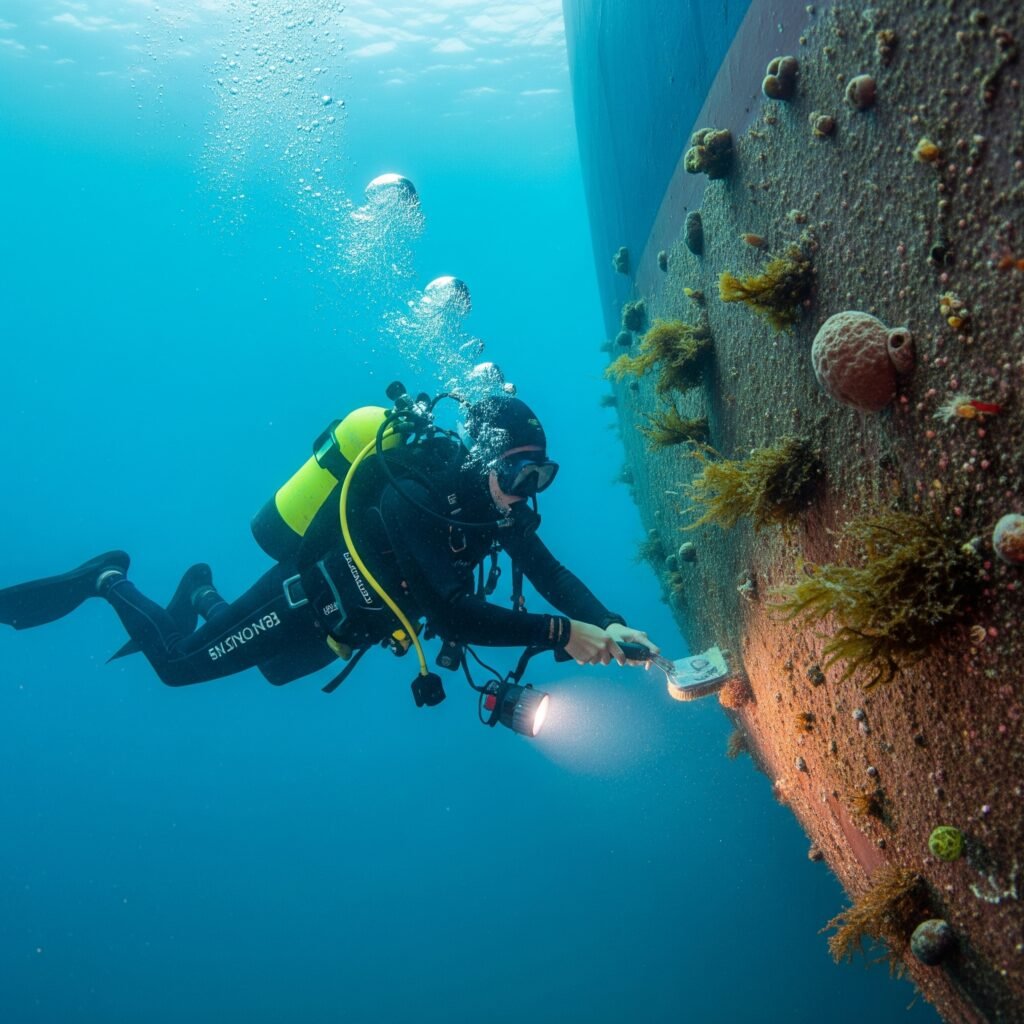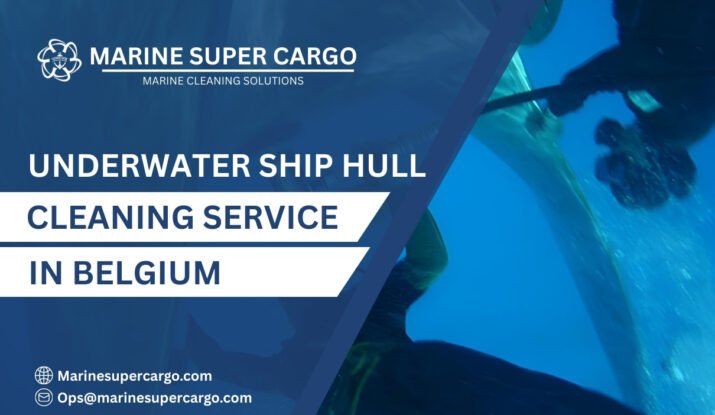In today’s fast-paced maritime industry, where operational efficiency, cost control, and sustainability are critical factors, shipowners and operators are constantly seeking methods to maintain peak vessel performance. One of the most effective yet often underestimated maintenance practices is underwater ship hull cleaning in Belgium.
With Belgium being home to some of Europe’s busiest and most strategically important ports—such as Antwerp, Zeebrugge, and Ghent—the demand for professional, eco-conscious, and reliable underwater ship hull cleaning services has grown significantly. For ship operators navigating high-traffic shipping lanes and competitive freight schedules, the condition of a vessel’s hull can mean the difference between profitable operations and costly inefficiencies.
Understanding Biofouling and Its Impact
One of the main reasons underwater ship hull cleaning in Belgium is so important is the challenge of biofouling—the accumulation of marine organisms like barnacles, algae, mussels, and other aquatic growth on the submerged surfaces of a ship’s hull. Over time, this build-up increases drag, disrupting the vessel’s hydrodynamic efficiency.
Even moderate biofouling can have severe operational consequences:
- Increased Fuel Consumption – Studies show that light to moderate biofouling can increase fuel usage by up to 15%, while heavy growth can raise that number significantly.
- Higher Carbon Emissions – More fuel burned means higher greenhouse gas emissions, putting pressure on environmental compliance targets.
- Engine and Component Strain – Increased drag forces engines and propulsion systems to work harder, leading to accelerated wear and tear.
- Reduced Speed and Maneuverability – Biofouled hulls can reduce a vessel’s cruising speed and responsiveness, which is especially problematic in congested waterways and ports.

Why Underwater Ship Hull Cleaning in Belgium Is Critical
Belgium’s maritime sector is a hub of international trade, with its ports handling millions of tonnes of cargo every year. In such a high-demand environment, the performance of a vessel directly influences turnaround times, operating costs, and schedule reliability. Clean hulls ensure vessels move through the water with minimal resistance, conserving fuel and lowering emissions.
From a regulatory standpoint, the International Maritime Organization (IMO) and the European Union have implemented strict guidelines to prevent the spread of invasive species and reduce marine pollution. Many port authorities are now carrying out detailed inspections of arriving vessels, including hull condition checks. Ships that fail to meet cleanliness standards can face fines, delays, or even denial of entry—an operational setback that can be avoided with regular underwater ship hull cleaning.
Environmentally Responsible Hull Maintenance
In today’s shipping industry, sustainability is more than a buzzword—it’s a legal and commercial necessity. Modern underwater ship hull cleaning in Belgium prioritizes methods that balance effectiveness with environmental protection.
Advanced non-abrasive cleaning tools are used to remove stubborn marine growth without damaging the vessel’s protective antifouling coatings. Preserving these coatings is essential, as they help slow down future biofouling and reduce the need for frequent cleanings.
Additionally, eco-friendly cleaning agents approved by the IMO and compliant with Belgian and EU environmental laws are now standard. These biodegradable solutions ensure that marine flora and fauna remain unharmed during the cleaning process, which is crucial for the North Sea’s already fragile marine ecosystem.
Tailored Solutions for Different Vessel Types
No two vessels are alike, and neither are their maintenance needs. Underwater ship hull cleaning in Belgium is customized to suit various ship categories, including:
- Cargo Vessels – Require efficient turnaround times and minimal disruption to schedules.
- Container Ships – Need smooth hull surfaces to maintain tight delivery windows.
- Cruise Liners – Benefit from optimized fuel efficiency and enhanced maneuverability.
- Tanker Ships – Demand high safety standards and eco-conscious cleaning methods.
Before cleaning begins, technicians conduct a detailed inspection of the hull’s condition, following best practices outlined by organizations like the International Marine Contractors Association (IMCA). This ensures the correct equipment, cleaning pressure, and techniques are applied. For ports supporting sustainable maritime solutions, such as the Port of Durrës, these tailored services contribute to both efficiency and environmental responsibility.
Key Belgian Ports for Underwater Ship Hull Cleaning in Belgium
Belgium’s strategic location makes it a central maritime hub for Europe. Underwater ship hull cleaning in Belgium services are especially valuable in its major ports:
- Port of Antwerp – One of the largest ports in the world, handling a diverse range of cargo types.
- Port of Zeebrugge – Known for its roll-on/roll-off (Ro-Ro) traffic and container handling.
- Port of Ghent – Plays a vital role in industrial cargo and inland waterway connections.
In these high-traffic areas, efficiency and readiness are non-negotiable. By maintaining a clean hull, vessels can avoid delays, improve scheduling accuracy, and reduce their operational footprint.
Beyond Hull Cleaning: Complementary Underwater Ship Hull Cleaning in Belgium
While underwater ship hull cleaning in Belgium is the primary maintenance service, Belgian maritime operators also benefit from complementary underwater operations such as:
- Propeller Polishing – Even minor imperfections on a propeller surface can affect thrust and fuel efficiency. Polishing restores smoothness, improving water flow and propulsion.
- Underwater Inspections – Using high-definition cameras and remotely operated vehicles (ROVs), inspectors identify cracks, corrosion, or structural issues early.
- Anode Replacement – Ensures ongoing corrosion protection for metal components.
- In-Water Surveys (IWS) – Allows classification societies to assess vessel conditions without requiring dry docking.
These additional services help shipowners maintain vessel integrity, avoid costly repairs, and meet inspection requirements without interrupting operations.

Long-Term Benefits of Underwater Ship Hull Cleaning in Belgium
Regular underwater ship hull cleaning in Belgium offers several long-term advantages:
- Fuel Efficiency – Clean hulls reduce drag, allowing vessels to maintain speed with less power.
- Lower Emissions – Reduced fuel consumption directly translates into fewer greenhouse gas emissions.
- Improved Performance – Enhanced maneuverability and responsiveness are critical in congested ports.
- Extended Asset Life – Less strain on engines and propulsion systems prolongs equipment lifespan.
- Regulatory Compliance – Vessels remain in line with IMO and Belgian environmental regulations, avoiding fines and delays.
When integrated into routine maintenance schedules, underwater ship hull cleaning becomes a strategic investment rather than a reactive expense.
Conclusion
Underwater ship hull cleaning in Belgium is far more than a cosmetic service—it is a vital operational practice that influences a ship’s efficiency, profitability, and environmental responsibility. In a competitive maritime landscape, where ports are busier and regulations stricter than ever, maintaining a clean hull is one of the most cost-effective ways to ensure smooth sailing, fuel savings, and regulatory peace of mind.
By embracing advanced, eco-friendly cleaning technologies and tailoring services to vessel-specific needs, shipowners can safeguard both their bottom line and the marine environments they operate in. In Belgium’s critical ports, this proactive approach keeps fleets running at their best, voyage after voyage.
FAQ:
Q1. How often should underwater ship hull cleaning be performed in Belgium?
Every 6–12 months, more often in warmer or nutrient-rich waters.
Q2. Does it damage antifouling paint?
No, modern non-abrasive methods preserve protective coatings.
Q3. Can hull cleaning be done while the ship is in port?
Yes. Professional underwater cleaning teams can perform the service during cargo operations or layovers, minimizing downtime.
Q4. Is it legally required in Belgium?
Not always, but many ports enforce cleanliness standards.
Q5. What are the environmental benefits?
Clean hulls improve fuel efficiency, reducing carbon emissions, and prevent the transfer of invasive marine species, helping to protect local ecosystems.


